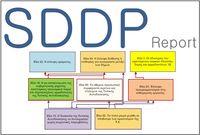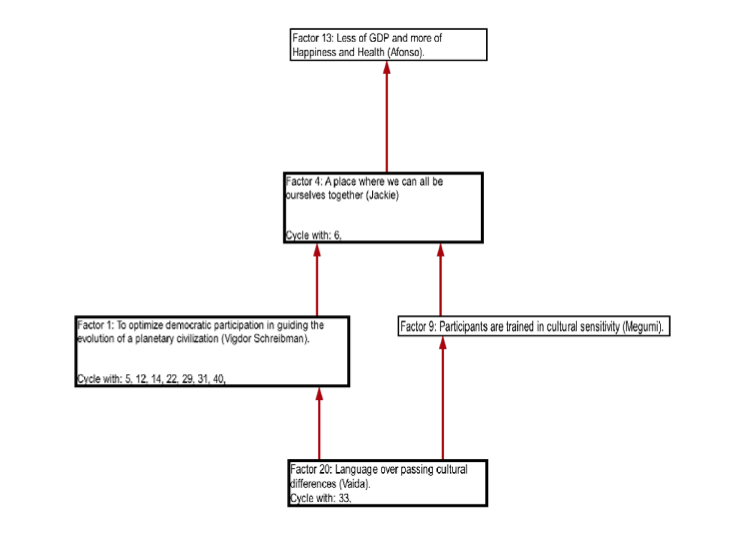Planetary Dialogue Agora of Philanthropolis: Difference between revisions
(Added alternative TQ proposed by Schreibman) |
|||
| (2 intermediate revisions by the same user not shown) | |||
| Line 12: | Line 12: | ||
|editor= [[Yiannis Laouris]] | |editor= [[Yiannis Laouris]] | ||
|total_duration=3 weeks | |total_duration=3 weeks | ||
|stats=Participants= | |stats=Participants=19 <br> Number of ideas=59 <br>Number of Clusters=14 <br> Ideas received Votes=33 <br> Ideas on MAP R=14 <br>Spreathink ST=51% <br>Situational Complexity SCI= | ||
|isbn=ISBN | |isbn=ISBN | ||
|link=[[Media:Planetary_SUMMARYREPORTCOLABIJUNE2007.pdf|Download Report]]<br>[[Media:Ozbekhan_PhilanthropolisApril23.pdf|Download Pre-Report]] | |link=[[Media:Planetary_SUMMARYREPORTCOLABIJUNE2007.pdf|Download Report]]<br>[[Media:Ozbekhan_PhilanthropolisApril23.pdf|Download Pre-Report]] | ||
| Line 98: | Line 98: | ||
* Idea 20: Language over passing cultural differences (Vaida) | * Idea 20: Language over passing cultural differences (Vaida) | ||
* Idea 33: Extra-linguistic Cultural Understanding (Esenbek) | * Idea 33: Extra-linguistic Cultural Understanding (Esenbek) | ||
==Alternative options for the Triggering Question== | |||
Before the above Triggering Question was selected, Vigdor Schreibman, proposed as alternative: | |||
What are the theories of action which, if adopted and used to guide decision-making will produce the ideal image of the New Agora of Philanthropolis? | |||
His reasoning was grounded in a previous communication in which Jacqueline Howell Wasilewski wrote “I keep thinking of the Cook Island Maori woman | |||
who stood up in a meeting in Vanuatu in 1991 and said that | |||
her idea of an appropriate global order was one "where the voice | |||
of a hummingbird was listened to with as much respect as the voice of an eagle". According to Schreibman, his proposed TQ also encourages the adoption of the optimum set of theories of action that control decision-making within the Setting for decisions of the Information-age. It would thus enable participants to define the location of power in the current situation, as a basis for designing a new system, which is the best practice, on Synergy, according to Warfield (1998), following Argyris (1978) and satisfies the requirements of critical systems thinking | |||
Schreibman argued that the latter goals are particularly significant on the path to realizing The Transformative Paradigm, as he has also committed to them from the initiation of the Lovers of Democracy enterprise. | |||
“Freedom of choice and the guarantee of access for the voice of a hummingbird need little further explanation but in an environment in which choice is increasingly shaped in a context driven by an overpowering technological civilization citizens can realize their valued freedoms only to the extent they become masters of the theories of action by which they can coherently manage decision-making powers. As free choice becomes more problematical, however, the need of citizens for an understanding and grasp of the theories of action governing decision-making, most likely becomes indispensable. | |||
It is necessary to accept our responsibilities in Knowledge Management by preparing participants for the unique normative style of the Planetary Dialogue, to deal effectively with such conditions. Normative planning opens an unusually large and, somewhat, intimidating space for futures creative planning, which requires special powers of analytical visioning. This may benefit by a greater level of theoretical knowledge about decision-making. | |||
Free choice without that understanding of reality in normative planning simply throws the citizen deeper into the grip of uncertainty when addressing the instrumental powers of big government and big business. Better preparation to understand the decision-making process can optimize the citizen’s psychic powers and our collective capacity to listen to each other, even to the voice of a hummingbird." | |||
| Line 165: | Line 180: | ||
[[Category:Future Worlds Center Projects]] | [[Category:Future Worlds Center Projects]] | ||
[[Category:Projects with SDD]] | [[Category:Projects with SDD]] | ||
Latest revision as of 00:34, 27 July 2023
|
Executive Summary
An international panel of 22 experts/stakeholders in e-democracy and structured dialogue were engaged for three weeks in an asynchronous and synchronous virtual interaction employing the technology of the Webscope wiki. The panel was invited to use the Structured Dialogic Design Process (SDDP).
This 2008 Historic Virtual SDDP was probably the first conducted with all participants located in different continents.
The Triggering Question (TQ) of the workshop was:
What are descriptors/requirements of the ideal image of the Agora of Philanthropolis
In response to the TQ, the 22 participants came up with 59 ideas, which were categorized into 14 clusters. Following the voting process, 38 ideas received one or more votes and 14 were structured to create the influence MAP shown below.
Clusters
- CYBERSPACE CAPITAL
- TRANSCENDENCE
- STAKEHOLDER ENGAGEMENT
- ETHICAL SENSITIVITY
- DIGITAL DIVIDE
- LANGUAGING
- POST-CAPITALISM
- OLIGARCHY
- HUNGER
- KNOWLEDGE
- ECOLOGY BALANCE
- CYBER POLICE
- EQUALITY
- FEEDBACK
Voting
- 4: (6 Votes) A place where we can all be ourselves together (Jackie)
- 5: (6 Votes) A place where everyone affected by a problem is considered a stakeholder (Jackie)
- 1: (5 Votes) To optimize democratic participation in guiding the evolution of a planetary civilization (Vigdor Schreibman).
- 6: (5 Votes) A place where we can create a global culture of care (Jackie).
- 12: (5 Votes) Connect grass-roots voices and incorporate them in the work done by global leaders (Zare). 9: (4 Votes) Participants are trained in cultural sensitivity (Megumi).
- 29: (4 Votes) Philanthropolis is home (Uyanga).
- 20: (3 Votes) Language over passing cultural differences (Vaida).
- 22: (3 Votes) A World Free from Hunger (Cy Rago).
- 31: (3 Votes) Place of Sharing (Esenbek).
- 33: (3 Votes) Extra-linguistic Cultural Understanding (Esenbek).
- 2: (2 Votes) To optimize development of CyberspaceCapital (Vigdor Schreibman).
- 7: (2 Votes) Everyone have access to the same technology (Megumi). 10: (2 Votes) Transcendence of our differences (Zare).
- 13: (2 Votes) : Less of GDP and more of Happiness and Health (Afonso). 17: (2 Votes) A voice to all affected parties (Anni).
- 19: (2 Votes) Respect for an individual as a basis for the ethics of Philantropolis (Vaida). 30: (2 Votes) Emphasis on strengths (Uyanga).
- 32: (2 Votes) A Place for Shattering Stereotypes (Esenbek).
- 36: (2 Votes) Schooling for Understanding (Shuichiro).
- 40: (2 Votes) Knowledge is open to everyone (Ayumu).
- 42: (2 Votes) Love the environment as well, not just humans (Ayumu).
- 43: (2 Votes) Free Internet for all (Yiannis).
- 52: (2 Votes) A PLACE (CYBERSPACE) TO LEARN TO CARE (Hernan).
- 53: (2 Votes) Participation of all stakeholders (Xianghui).
- 55: (2 Votes) Equality (Xianghui).
- 57: (2 Votes) The place of learning and teaching (Shuko).
- 3: (1 Votes) To optimize development of OmniCapital (Vigdor Schreibman).
- 11: (1 Votes) Global Spiritual Revolution (Zare).
- 14: (1 Votes) Expose current democracy as an oligarchy in reality (Afonso). 16: (1 Votes) Voluntary free participation for all decisions (Anni).
- 18: (1 Votes) Face to face group discussions on several levels (Anni).
- 24: (1 Votes) Utilization of Internet (Information Technology) for Meaningful Dialogues (Cy Rago).
- 27: (1 Votes) Engaging Dialogue (Roselle).
- 28: (1 Votes) : Everyone is a family (Uyanga).
- 34: (1 Votes) Peace Talks (Shuichiro).
- 46: (1 Votes) Prizes for social entrepreneurship: socially responsible, creative innovations (Yiannis).
- 50: (1 Votes) A PLACE TO GENERATE 'CULTURAL PRACTITIONERS' (Hernan).
Map
According to the participants of this workshop, the ideas that appear to be the most influential were:
- Idea 20: Language over passing cultural differences (Vaida)
- Idea 33: Extra-linguistic Cultural Understanding (Esenbek)
Alternative options for the Triggering Question
Before the above Triggering Question was selected, Vigdor Schreibman, proposed as alternative: What are the theories of action which, if adopted and used to guide decision-making will produce the ideal image of the New Agora of Philanthropolis? His reasoning was grounded in a previous communication in which Jacqueline Howell Wasilewski wrote “I keep thinking of the Cook Island Maori woman who stood up in a meeting in Vanuatu in 1991 and said that her idea of an appropriate global order was one "where the voice of a hummingbird was listened to with as much respect as the voice of an eagle". According to Schreibman, his proposed TQ also encourages the adoption of the optimum set of theories of action that control decision-making within the Setting for decisions of the Information-age. It would thus enable participants to define the location of power in the current situation, as a basis for designing a new system, which is the best practice, on Synergy, according to Warfield (1998), following Argyris (1978) and satisfies the requirements of critical systems thinking
Schreibman argued that the latter goals are particularly significant on the path to realizing The Transformative Paradigm, as he has also committed to them from the initiation of the Lovers of Democracy enterprise.
“Freedom of choice and the guarantee of access for the voice of a hummingbird need little further explanation but in an environment in which choice is increasingly shaped in a context driven by an overpowering technological civilization citizens can realize their valued freedoms only to the extent they become masters of the theories of action by which they can coherently manage decision-making powers. As free choice becomes more problematical, however, the need of citizens for an understanding and grasp of the theories of action governing decision-making, most likely becomes indispensable. It is necessary to accept our responsibilities in Knowledge Management by preparing participants for the unique normative style of the Planetary Dialogue, to deal effectively with such conditions. Normative planning opens an unusually large and, somewhat, intimidating space for futures creative planning, which requires special powers of analytical visioning. This may benefit by a greater level of theoretical knowledge about decision-making. Free choice without that understanding of reality in normative planning simply throws the citizen deeper into the grip of uncertainty when addressing the instrumental powers of big government and big business. Better preparation to understand the decision-making process can optimize the citizen’s psychic powers and our collective capacity to listen to each other, even to the voice of a hummingbird."
The co-laboratory was facilitated by a team led by Aleco Christakis. While Aleco was based in Crete, his Co-Facilitators, and Assistant Facilitators were based in the USA and in Cyprus.
Facilitators
| Name | City |
|---|---|
| Aleco Christakis | Archanes, Crete |
| Gayle Underwood | Allegan, Michigan, USA |
| Yiannis Laouris | Nicosia, Cyprus |
| Elia Petridou | Nicosia, Cyprus |
| Maria Georgiou | Nicosia, Cyprus |
Participants
- Vigdor Schreibman
- Jackie
- Megumi
- Zare
- Afonso
- Anni
- Vaida
- Cy Rago
- Roselle
- Uyanga
- Esenbek
- Shuichiro
- Jerome
- Ayumu
- Yiannis
- Gina
- Hernan
- Xianghui
- Shuko

